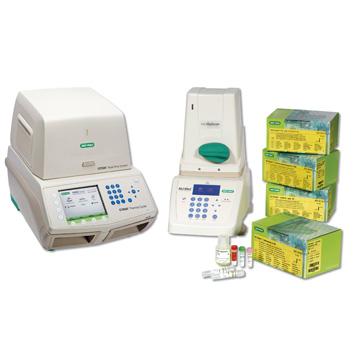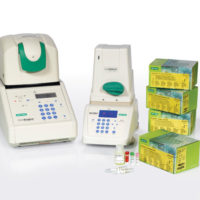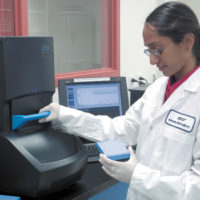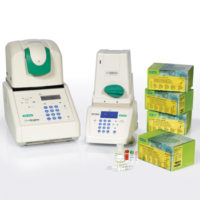High-throughput PCR Provides Real-time Solutions

Foodborne bacterial contamination is estimated to cause about 76 million illnesses per year in the United States alone. In a report from the United States Department of Agriculture Economic Research Service, foodborne illnesses account for about 1 of every 100 hospitalizations and 1 of every 500 deaths in the US. The most common bacterial pathogens attributed to outbreaks are Salmonella, Listeria monocytogenes, Escherichia coli O157:H7 and Campylobacter. According to a Centers for Disease Control and Prevention report tracking foodborne illnesses in 2007, of all the outbreaks attributed to a single food, 17% were from poultry, 16% from beef and 14% from leafy vegetables. Other food commodities have been plagued by massive recalls due to contamination including peanut butter, tomatoes, spices and, more recently, eggs.
The iQ-CheckTM real-time polymerase chain reaction (PCR) system from Bio-Rad Laboratories was designed specifically with the needs of users in mind with kits available for Salmonella, L. monocytogenes, Listeria spp., E. coli O157:H7 and Campylobacter. The use of highly specific probes and primers results in excellent sensitivity and specificity, validated by AOAC. With a high-throughput extraction, all pathogens can be tested at the same time, making life for the laboratory a little bit easier. Two instrument platforms are available for all sized labs. The 96-well, 5 color CFX96TM system is designed for high-throughout analysis while the 48-well, 2 color MiniOpticonTM is perfect for smaller labs.
In Need of a Better Method
Chestnut Labs (Springfield, MO) provides clients with food safety testing, auditing, training, consultation and research including test kit validations and shelf-life studies. In operation for more than 20 years, the lab is recognized for its superior customer service and ability to be a value-added business partner for its clients. Chestnut Labs operates under the ISO 17025 principles and is committed to providing clients with a commitment to quality and constant improvement.
Michael Clark, laboratory director at Chestnut Labs, mentions that cost and turnaround time are very important to their customers. The company needed a fast and dependable real-time PCR platform where multiple pathogens could be tested simultaneously. The laboratory needed a protocol that was user friendly and capable of high-throughput analysis to eliminate the usual bottleneck areas common of real-time PCR tests. The iQ-Check method met those needs. With the combination of the high-throughput extraction protocol, the CFX96 real-time PCR detection system and the CFX Manager Software, Chestnut Labs was able to provide their customers with reliable, next-day results without passing on an additional cost.
When asked what the advantages of this product were for their use, Clark added, “The use of a deep-well microplate allows for the high-throughput processing of 96 samples at a time. The deep-well protocol has eliminated the multiple heating, shaking and lysis steps associated with most commercial PCR kits by consolidating the steps into one. Using the deep-well plate protocol allows multichannel pipetting for most steps of PCR preparation, saving time and reducing cross-contamination. The software is simple to use and interpret, and the option to email results with an attached data file helps reduce time. Faster PCR times increase productivity. The use of non-proprietary enrichment broths helps us reduce the overall cost per sample.” Some additional benefits of the system include no special sample preparation or post enrichment re-grow step, the inclusion of an internal control to validate the PCR runs as well as a small footprint that does not take up much bench space.
Standard methods, such as the U.S. Food and Drug Administration’s Bacteriological Analytical Manual (BAM) testing method, which involves a pre-enrichment step followed by a second selective enrichment step and plating (which can include secondary plating), takes 72–96 hours (3–4 days), which depends on the food sample being analyzed and must be followed by biochemical/serological confirmation, increasing the time to results to up to 5 days minimum. The iQ-Check Listeria spp. and L. monocytogenes kits only require a 24 hour enrichment. The Salmonella test requires a 20 hour enrichment, and the E. coli O157:H7 test can be processed after an 8 hour enrichment.
Chestnut Labs tests for all significant food pathogens and indicator organisms to provide the highest service for their clients. For them, Bio-Rad’s iQ-Check kits have increased productivity through faster and simpler sample preparation, faster PCR run times and the capability of running multiple pathogens at the same time. Their customers also benefit by receiving results faster, which reduces their product hold time.
foodscience.bio-rad.com
Looking for a reprint of this article?
From high-res PDFs to custom plaques, order your copy today!





